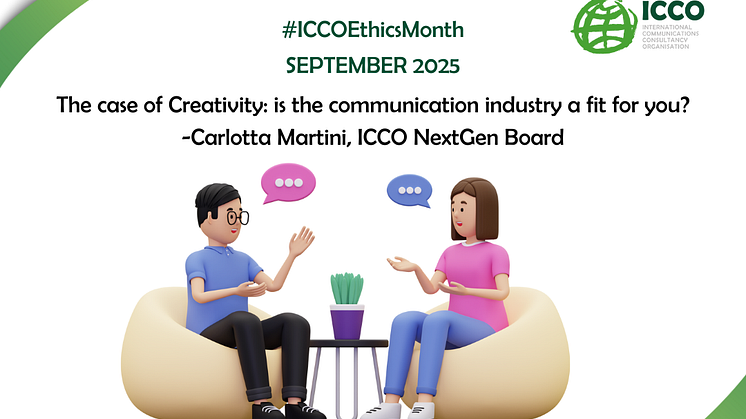
Blog post -
The Case of Creativity: Is the Communication Industry a Fit for You?
Many young professionals feel the pressure to find a career that not only provides a steady income but also aligns with their passions and values. You're constantly told to "find your purpose" or "do what you love", but when it comes to a career, what does that actually mean? For a generation that's grown up using social media as a canvas for creativity and self-expression, the answer might be closer than you think.
This article explores a simple but important question: is the communication industry a fit for you? As a young professional, I've seen firsthand how this field has become a necessary home for creative minds, as it thrives on the very skills we've been honing our entire life.
If you're looking for a career that values fresh ideas and gives you the tools to make a real-world impact with your creativity, then this article is for you.
A New Generation of Creatives
Recent studies suggest that both Millennials and Gen Z are perceived as and perceive themselves as more creative than previous generations, which is supported by a significant shift in their values and how they approach work. They're not just looking for a paycheck; they're looking for roles that align with their personal values and sense of purpose. This has led to a workforce that places a high priority on creativity, autonomy, and flexibility.
Gen Z, in particular, stands out for their high creative self-perception. Over half of Gen Z believe they are more creative than older generations. They're also more likely to engage in creative activities in their free time and are heavily inspired by digital content. This generation is drawn to careers that offer a blend of creativity, technology, and autonomy. Their entrepreneurial spirit is strong, with many seeking out freelance opportunities, even launching their own startups. They value digital fluency and see technology as a way to express creativity and pursue non-traditional paths.
While Millennials share a tech-savvy nature and high value on work-life balance and flexibility, studies show they may be more focused on using established business models to solve problems rather than seeking outright disruption. However, Millennials still seek to align their work with their personal values and prefer jobs that offer a sense of purpose beyond financial rewards. They also have a strong preference for continuous learning and professional development, which they see as key to career success. This desire for continuous learning and innovation is directly linked to creative performance in the workplace.
This new generation of the workforce is digitally native, entrepreneurial, and actively seeking outlets for their creativity.
The question then becomes, where can these traits be best applied professionally?
The Communication Industry: A Creative Playground
The communication industry is no longer just the world of press releases and media relations. Today, the most memorable campaigns are highly creative, visually powerful, and designed to live across digital and offline worlds. While people see the final results, the journey from a raw idea to a polished campaign is not as widely known.
The creative process in communication is a structured, methodical journey that brings together research, strategy and artistry to produce campaigns that resonate with audiences. It is a collaborative effort that requires a diverse range of skills from different professionals, which requires creative thinking at every stage.
The core of our work is compelling storytelling, which is fundamentally a creative act.
Take, for example, the “Weather Kids” campaign by UNDP. What could have been just another climate awareness message became something far more powerful: children delivering the weather forecast of their own uncertain future. By placing young voices at the center of the story, the campaign turned an abstract issue into something deeply personal and urgent. This is the power of creativity applied not just to visuals and slogans, but to the deeper question: what story are we telling, and why does it matter?
Here’s how creativity takes shape across different areas of communication:
- Public Relations: It’s no longer just about writing a press release. It's about crafting a narrative that captivates an audience, whether through a purpose-driven campaign or a powerful piece of content. Creativity is essential for making a brand's story resonate in a noisy world.
- Social Media & Digital: This space is a constant incubator for creativity, where the ultimate goal is community building; success is measured by how well you can connect with an audience, and that requires constant innovation and risk-taking—traits that come naturally to the newest generation.
- Integrated Strategies: Today’s most impactful campaigns blur the lines between PR, social media, marketing, and advertising. They require an integrated and creative approach to storytelling that can be - and should be - adapted across multiple channels.
At its core, the communications industry, in all its forms, provides a professional space where the desire for creative self-expression and innovative thinking can be a professional asset.
Of course, creativity in communications isn’t all free-flowing inspiration. It also means working under tight deadlines, navigating client demands, and finding the balance between originality and business objectives. For some, these constraints can feel limiting. But for others, they spark problem-solving and make success even more rewarding.
Is the Communications Industry a Fit for You?
If you're still undecided about your career path, here are a few questions to help you determine if the communications industry is the right fit for your creative spirit:
- Do you find yourself analyzing the ad campaigns you see every day? If you instinctively notice a good social media ad, a clever brand slogan, or a powerful public statement, you're already thinking like a communicator. Rather than passively consuming content, you’re already deconstructing how it works.
- Do you get a kick out of turning a complicated idea into a simple story? A core part of communication is translating complex information into a clear, compelling message. If you can explain a difficult topic to someone in a way that just "clicks," you're a natural storyteller. This skill is vital for roles like Public Relations Specialists, who need to craft narratives that capture attention and gain media coverage.
- Does the thought of a fast-paced environment with shifting priorities excite you? The communications landscape is dynamic and ever-changing. It demands adaptability and a willingness to juggle multiple projects. If you thrive on constant change and enjoy a challenge, this industry could be a perfect fit.
Looking ahead
The communications industry is not for everyone. It can be demanding, unpredictable, and fast-moving. But for those who see creativity as a core value, for those who want to make stories, ideas, and innovations resonate on a larger stage, it can be one of the most rewarding career paths out there.
If creativity is your compass, the communications industry might just be the landscape where it leads you.

